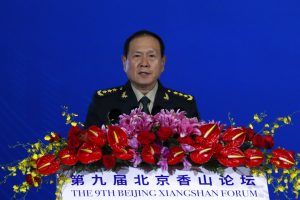By Abhijnan Rej

The Chinese defense minister, Wei Fenghe, visited Pakistan on December 1 and met with the country’s President Arif Alvi and Prime Minister Imran Khan, along with meeting Chairman of the Joint Chiefs of Staff Committee Nadeem Raza and Chief of Army Staff General Qamar Javed Bajwa. Earlier this week Wei had also visited Nepal.
Writing on Wei’s Islamabad trip, China Global Television Network (CGTN) noted him as saying that “the China-Pakistan all-weather strategic cooperative partnership is unique in the world,” language consistent with how China publicly describes Pakistan. During Wei’s visit, both countries signed a memorandum of agreement around greater defense cooperation.
According to CGTN, during Wei’s visit, Alvi promised Pakistan’s support to China across issues including the South China Sea, Taiwan, and Tibet, and also to push ahead with the China-Pakistan Economic Corridor. Interestingly, according to CGTN, Wei also said China is “keen to jointly cope with risks and challenges with Pakistan, firmly safeguard the sovereignty and security interests of both countries and maintain regional peace and stability,” language that would inevitably be interpreted in India as directed toward that country.
And this has indeed happened. The Hindustan Times (HT) quoted Indian experts as saying that Wei’s Nepal and Pakistan visits were with one eye on India, as New Delhi continues to wrangle with both Kathmandu and Islamabad. The newspaper noted a former Indian ambassador Vishnu Prakash, who had served in both Pakistan and China, as saying “China was letting Pakistan and Nepal know it is still with them and this was also a message to India.” “In Islamabad, the Chinese clearly wanted to add some steel to Pakistan’s spine,” HT also quoted Prakash as saying.
Back in May, the Indian army chief, General Manoj Mukund Naravane, created a small storm in Kathmandu with his remark at a think tank event that Nepal’s objections to an Indian road that connects the state of Uttarakhand to the China-India-Nepal trijunction in Lipulekh was at the behest of China. Naravane visited Nepal last month as New Delhi and Kathmandu inch toward mending fences.
Over the year, as the Ladakh crisis continued unabated, Indian strategic experts pointed to the possibility of a two-front war where China and Pakistan on one side, and India on the other, find themselves in a shooting conflict. What has added salience to this fear is that India-Pakistan ceasefire violations show no sign of slowing down, with heavy artillery guns being used by both sides with alarming frequency over the past few years. On November 13, 11 Indians – including five members of Indian security forces – were killed in ceasefire violations along the Line of Control in India-administered Jammu and Kashmir’s Gurez and Uri sectors.
Indian media reports have also noted China’s continued military support to Pakistan, including in Pakistan-administered Kashmir and Gilgit-Baltistan. In October, one of them noted that according to the Indian security establishment, China was helping Pakistan install a new surface-to-air missile system in the part of Kashmir it administers. China and Pakistan have a long history of military cooperation, which has included covert Chinese support for Pakistan’s nuclear-weapons program.
However, not all Pakistani analysts are convinced that China and Pakistan would be able, or willing, to jointly fight a war against India, fears of New Delhi’s defense establishment notwithstanding. Speaking at a virtual event organized by a New Delhi think tank on December 1, Ayesha Siddiqa noted that there is limited interoperability between the militaries of the two countries, and that both would not prefer a large conventional war with India. Instead, Siddiqa suggested, for Pakistan, China’s role is strategic as it manages to do what Pakistan hasn’t been able to: keep India in check.
No comments:
Post a Comment